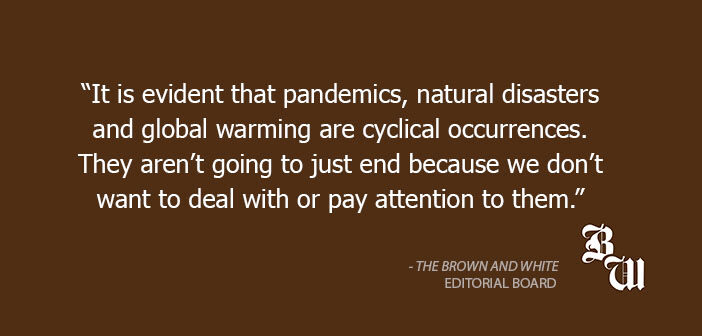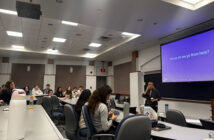As of this past Monday, forest fires throughout California have burned an area near the size of Connecticut, CNN reports.
California Gov. Gavin Newsom and Los Angeles Mayor Eric Garcetti attribute the intensity of 2020’s wildfire season to climate change. Garcetti even went as far as to comment on the Trump administration’s poor response to the crisis in telling CNN “the cost of denial is that people lose their lives and their livelihoods.”
Last winter, Australia saw horrendously violent bushfires that decimated 46 acres of land, which is nearly the size of Syria, including 80 percent of the Blue Mountains World Heritage Area and 53 percent of the Gondwana World Heritage Rainforest. Over a billion animals were killed, and economically speaking, over $1.3 billion dollars were filed in insured claims.
What is different about what is occurring on the West Coast when compared to Australia is that this is happening on our own soil. When natural disasters occur halfway across the world, it is easy for us to turn a blind eye and think, ‘Oh, that would never happen here.’
But it has. And it is.
While California is not every American’s backyard, this is something that should strike all of us. We can’t turn a blind eye anymore when we find something scary or it doesn’t directly concern our daily lives. Just because it doesn’t impact you doesn’t mean that you shouldn’t care.
Just two weeks ago, The Brown and White Editorial Board wrote a piece on the need to pay more attention to climate change given heightened severity in recent hurricanes in the United States as well as how environmental issues directly contribute to the continuation of future pandemics.
While we don’t wish to repeat such previously made points, we are here addressing the same concerns yet again given more national natural disasters. If anything, these wildfires only strengthen all we tried to say earlier this month.
The Trump administration was given yet another national crisis to handle and once again it refused to acknowledge the issue in its entirety and fully address the causes of such situations.
It is evident that pandemics, natural disasters and global warming are cyclical occurrences. They aren’t going to just end because we don’t want to deal with or pay attention to them. And given rising severity in all of the aforementioned events, it is evident that these are only going to continue to happen harsher and more frequently — often impacting the most vulnerable among us most harshly.
If there are no governmental authority figures helping to keep American citizens informed, it is on us to do the work on our own. It is critical that we find the appropriate news sources to tell us the facts so that we aren’t oblivious to what is happening from coast to coast or even nation to nation.
With all that being said, given the events the world and our nation have endured this calendar year, it is more important now than ever to be considerate of other people’s circumstances. Much like how different families, communities and state government officials view certain aspects of the pandemic differently, we don’t all come from the same neighborhoods.
At Lehigh, we pride ourselves on having a diversified student body both domestically and internationally. East Coast-based students may not have a full understanding of what their Californian classmates and their families are enduring back at home.
While this clearly applies to what is going on within the last few weeks pertaining to wildfires and tropical storms, an empathetic mindset is one that all of the Lehigh community should be keeping front of mind.
A common theme we have written about throughout the last several months is how uncertain, different and downright scary this academic semester is for students, staff and faculty.
In all truthfulness, it’s easier to be a good neighbor than a bad one. You never know what someone else may be going through behind their masks, both literally and figuratively.
Be considerate. Be mindful. Be the change you wish to see in the world.





Comment policy
Comments posted to The Brown and White website are reviewed by a moderator before being approved. Incendiary speech or harassing language, including comments targeted at individuals, may be deemed unacceptable and not published. Spam and other soliciting will also be declined.
The Brown and White also reserves the right to not publish entirely anonymous comments.
2 Comments
Due to the nature of our planet, we would do well to plan to react to realities and variations of weather and climate changes. It might help to identify trends and attempt to reduce inherent dangers, such as “ozone holes”. Stopping the trends may not by possible using human intervention but eliminating or reducing harmful effects should be a priority independent of politics.
“it’s easier to be a good neighbor than a bad one.” Hmm, better but not easier. I see a lack of effort, even minimal effort, in too many instances. What was once common courtesy is becoming uncommon. Thank you and you’re welcome, which assumes both speakers are sincere and gives both pats on the back, is often replaced by thank you and no problem; this gives one pat on the back and one WTF as in what was the problem that you decided didn’t exist.
“Be considerate. Be mindful. Be the change you wish to see in the world.” A concept that everyone should be able to live with and will make this a better world.
Remember your editorial rebuttal of voting 3rd party even though you weren’t necessarily a fan of HIllary – “both sides” 4 years ago. Welcome to one of the sides. You’ve watched one side erode the EPA. Is the other side better than what we have now, and you were dishonest in the name of some ideological purity?
3 supreme court justices later, countless regulations repealed that are spurring climate change, millions of funding in the pockets of the corrupt, 200k dead, and an economy that has collapsed. Are you ready to post a retraction, rebuke the editorial board from last election, and admit that one side is clearly not on your side?